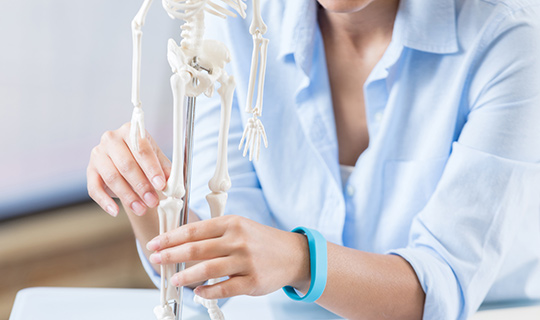
Make no bones about it - bones are essential for your overall health. Bones protect your brain, heart and other organs from injury; and store calcium, phosphorous and other minerals to help keep our bodies strong.
If you don’t eat right and exercise, your bones can become weak and even break, causing severe pain as well as creating long-term health complications.
So, how do you keep your bones strong and prevent bone loss? You can take action by eating right, exercising and living a healthy lifestyle.
Calcium
Eating a well-balanced diet and getting the right daily dose of calcium and vitamin D is the key to strong bones. The recommended dietary allowance (RDA) of calcium is 1,000 milligrams (mg) a day for adults, ages 19 to 50, and men ages 51 to 70. Women aged 50 and over and men aged 70 and over should boost their calcium intake to 1,200 mg a day.
Foods with high amounts of calcium include cheese, milk, tofu, beans, nuts and green leafy vegetables. Also consider calcium enriched brands of soy milk and orange juice. If you’re having trouble getting enough calcium from your diet, talk to your doctor about supplements.
Don’t Forget Vitamin D
Playing a round of golf on a beautiful sunny day is a great way to “catch some rays" and boost production of Vitamin D, which is essential for calcium absorption. Adults ages 19 to 70 should get 600 international units (IUs) a day, while adults 71 and older should get 800 IUs a day. Sources include egg yolks, oily fish like tuna and sardines, liver and fortified cereal.
Remember to protect your skin with sunscreen when in the sun.
Exercise
For stronger bones, 30 minutes of physical activity daily is suggested. Some great exercises for bone health include strength-building and weight-bearing exercises such as walking, climbing stairs, lifting weights, dancing – and golf!
Golfing can be very beneficial for bone health. With proper form, golfing puts the right amount of tension to help bone strength and density. Since golfing involves brisk walking and swinging, it helps to promote bone renewal and contributes to stronger muscles. Golfing can also help with balance, which means a lower risk of falls. So go ahead and swing! And, let your golf game help with your posture, coordination and flexibility over time.
Living a Healthy Lifestyle
Smoking and drinking in excess deteriorate bone health, as well damage your overall wellness. Avoiding these substances will go a long way.
For more information about bone health or to find a board-certified orthopedic physician specializing in bone health, sports performance and injuries, please visit rwjbh.org/medicalgroup or call 1-888-724-7123 for a referral.